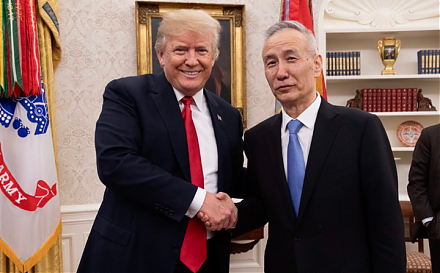

2018-07-13 09:41:00 Fri ET
technology antitrust competition bilateral trade free trade fair trade trade agreement trade surplus trade deficit multilateralism neoliberalism world trade organization regulation public utility current account compliance
Yale economist Stephen Roach warns that America has much to lose from the current trade war with China for a few reasons. First, America is highly dependent on China as a key source of low-cost products and services. As America increases its trade bets and tariffs on $200 billion imports from China, most U.S. households and firms would face higher costs due to inflationary concerns.
Second, the Chinese government holds huge dollar amounts of U.S. Treasury bills and notes. These investments help finance the perennial U.S. budget deficit. Third, erecting tariffs, quotas, and even embargoes may isolate America from the OECD free trade bloc. In turn, U.S. economic output expansion and employment growth may slow down as a result. For these reasons, America has much to lose from its current trade conflict with China.
In contrast, Mohamed El-Erian, chief economic advisor of Allianz, suggests that America is in a much stronger position to win the trade war against China. Further, it is crucial for America to protect its IT-driven intellectual property rights with better patent, trademark, and copyright enforcement. Chinese regulatory agencies have been notorious in requiring U.S. corporations to set up data centers and IT science parks in some major cities in China. In effect, this regulation transfers many patents and IT solutions from America to China.
The U.S. Trade Act Section 301 investigation hence concludes that it is opportune for the Trump administration to impose punitive tariffs on Chinese imports. Global stock market investors may suffer some short-term losses due to this relentless Sino-American trade conflict.
If any of our AYA Analytica financial health memos (FHM), blog posts, ebooks, newsletters, and notifications etc, or any other form of online content curation, involves potential copyright concerns, please feel free to contact us at service@ayafintech.network so that we can remove relevant content in response to any such request within a reasonable time frame.
2022-04-25 10:34:00 Monday ET

Corporate ownership governance theory and practice The genesis of modern corporate governance and ownership studies traces back to the seminal work
2019-12-25 19:46:00 Wednesday ET

Former White House chief economic advisor Nouriel Roubini discusses the major limits of central-bank-driven fiscal deficits. The International Monetary Fund
2019-03-09 12:43:00 Saturday ET

Pinterest files a $12 billion IPO due in mid-2019. This tech unicorn allows users to pin-and-browse images through its social media app and website. Pintere
2018-10-17 12:33:00 Wednesday ET

The Trump administration blames China for egregious currency misalignment, but this criticism cannot confirm *currency manipulation* on the part of the Chin
2020-07-05 11:31:00 Sunday ET

Business entrepreneurs dare to dream, remain true and authentic to themselves, and try to make a great social impact in the world. Alex Malley (2014)
2021-07-07 05:22:00 Wednesday ET

What are the best online stock market investment tools? Stock trading has seen an explosion since the start of the pandemic. As people lost their jobs an